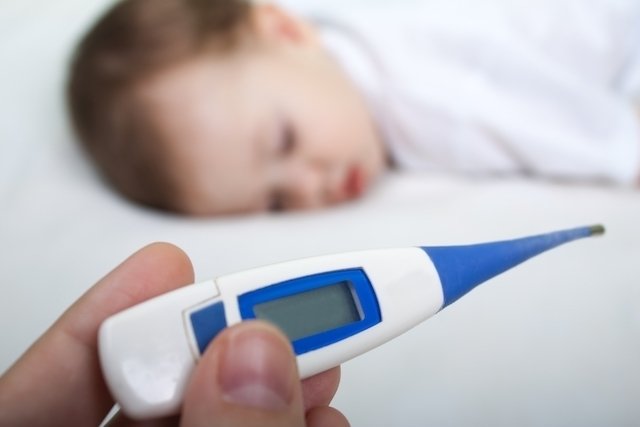Viral meningitis is a serious illness that causes symptoms such as severe headache, fever and stiff neck, due to inflammation of the meninges, which are the tissue that surrounds the brain and spinal cord.
Some viruses that can cause this type of meningitis are enteroviruses such as echo, coxsackie and polioviruses, arboviruses, mumps virus, herpes simplex virus, cytomegalovirus, Epstein-Barr virus, varicella zoster, measles, rubella, rotavirus and HIV 1 virus, for example.
Viral meningitis can be transmitted from one person to another, which is why it is important to adopt prevention measures, such as washing your hands frequently and avoiding close contact with people who have the disease. Generally, viral meningitis is curable and easy to treat, requiring only the use of analgesic and antipyretic medications to alleviate symptoms.

Symptoms of viral meningitis
The main signs and symptoms indicative of viral meningitis are:
- Fever above 38ºC;
- Intense headache;
- Stiffness in the back of the neck, so that it is difficult to move the neck and place the chin on the chest;
- Nausea and vomiting;
- Greater sensitivity to light;
- Irritability;
- Difficulty waking up;
- Decreased appetite.
In most cases, the symptoms of viral meningitis last between 7 and 10 days, and it is important that the treatment is carried out according to the doctor’s recommendation, as this makes it possible to prevent the development of complications, especially when meningitis occurs before the first year of life. , where there is a greater risk of neurological problems.
Watch the following video and learn how to identify the symptoms of viral meningitis:
Online symptom test
To find out if you have meningitis, please indicate your symptoms below:
This test is a tool that only serves as a means of guidance and, therefore, is not intended to provide a diagnosis nor does it replace consultation with an infectious disease specialist, neurologist or general practitioner.
How the diagnosis is made
The diagnosis of viral meningitis is made by a general practitioner, neurologist or infectious disease specialist based on the assessment of the signs and symptoms presented by the person, and a physical examination may also be carried out, which consists of mobilizing the neck to check whether the person can perform the movement. and if there is pain.
If you want to make an appointment, you can find the infectious disease specialist closest to you using the tool below:
Taking care of your health has never been easier!
The diagnosis is confirmed by carrying out laboratory tests, such as blood and urine tests and analysis of the cerebrospinal fluid (CSF), mainly, which is the liquid that covers the nervous system. From CSF analysis, it is possible to identify the agent responsible for meningitis.
How transmission happens
Viral meningitis can be caused by different types of viruses and, therefore, can be transmitted in different ways depending on the virus responsible for the disease. However, in general, the main ways of transmitting viral meningitis are:
- Sharing of glasses, plates and cutlery;
- Coughing, sneezing or salivating;
- Touch your hands to your eyes, nose or mouth after coming into contact with surfaces that contain the virus;
- Close contact with the infected person, such as kissing, shaking hands;
- Consumption of contaminated food and water;
- Mosquito bites, in the case of meningitis caused by arboviruses.
Normally, a person with viral meningitis does not need to be hospitalized in isolation, but if the doctor thinks it is better for the person not to have close contact with others, so that their own recovery can be faster, this indication may be given.
Treatment of viral meningitis
Treatment for viral meningitis can be done at home and aims to alleviate symptoms, as there is no specific antiviral medicine to treat meningitis, except when it is caused by the Herpes Zoster virus, in which Acyclovir can be recommended by the doctor. .
Therefore, to promote symptom relief, the use of analgesic and antipyretic medications, such as Paracetamol, may be indicated, in addition to being recommended that the person rest and drink plenty of fluids during the day. In severe cases, the treatment of viral meningitis must be carried out in the hospital so that the patient receives medicine and serum through a vein, in order to alleviate the symptoms until the virus is eliminated from the body.
The treatment of viral meningitis normally lasts around 7 to 10 days and it is important that during this period the patient takes some precautions to prevent the transmission of meningitis. The precautions are to wear a mask, not share food, drinks or personal objects, such as cutlery or toothbrush and wash your hands frequently.

Sign up for our newsletter and stay up to date with exclusive news
that can transform your routine!
Warning: Undefined array key "title" in /home/storelat/public_html/wp-content/plugins/link-whisper-premium/templates/frontend/related-posts.php on line 12
Warning: Undefined array key "title_tag" in /home/storelat/public_html/wp-content/plugins/link-whisper-premium/templates/frontend/related-posts.php on line 13




